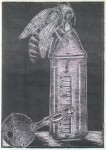Sections: Information | Plot Description | Fun Stuff
Information
- Related books:
- 5 Bestsellers Including Over 40 Tales of the Unexpected
- Alfred Hitchcock Presents: Stories to be Read With the Door Locked
- And Graves Give Up Their Dead
- Best Tales of Terror
- Chamber of Horrors
- Completely Unexpected Tales
- Cruelty
- Kiss Kiss
- Selected Stories of Roald Dahl
- Sinister and Supernatural Stories
- Tales of the Unexpected
- The 8th Fontana Book of Great Horror Stories
- The Best of Roald Dahl
- The Collected Short Stories of Roald Dahl
- The Complete Short Stories: Volume Two
- The Great Automatic Grammatizator and Other Stories
- The Roald Dahl Omnibus
- The Umbrella Man and Other Stories
- Wake Up Screaming
- Magazine publications:
- Audio Books:
- “Royal Jelly” read by Adrian Scarborough
- Further Tales of the Unexpected read by Geoffrey Palmer, Joanna David, Tom Hollander
- Kiss Kiss read by Edward Petherbridge
- Kiss Kiss read by Tamsin Greig, Juliet Stevenson, Adrian Scarborough, Stephanie Beacham, Derek Jacobi, Stephen Mangan
- TV Shows:
- Tales of the Unexpected (1979)
Plot Description
Personally, I think this is one of Dahl’s scariest stories. The description of the baby at the end… *shudder* I read it aloud to some of college roommates once and they were freaked out.
Spoiler warning! This is a simple story and concerns the Taylor family: Albert, Mabel, and their newborn baby daughter. Mabel is frightened because the child won’t eat and has been losing weight since birth. She’s desperate and frantic, but the doctors can’t do anything. After she goes to bed, Albert begins to read from one of his many books on beekeeping. He’s always had a way with bees, and now he makes his living by maintaining over 200 hives and selling the honey. This particular night he is reading about royal jelly, which is a substance that the worker bees produce and feed to the larvae for the first three days of their lives. It allows the young bees to rapidly mature and grow in size. Queen bees, however, are continuously fed the stuff throughout their larval life. It’s what actually, physically changes them into queens. Albert gets the idea that this stuff could help his daughter grow too. When Mabel comes downstairs the next morning, she is astounded to hear that the baby has drank five ounces of milk throughout the night. She watches as Albert prepares another bottle and the child ravenously drains the entire contents. She gets curious, though, when Albert later claims to have cured the baby himself. He finally confesses that he added large quantities of royal jelly to the baby formula, much to Mabel’s shock and dismay. He tries to convince her with facts and statistics, but she will have none of it. She tells him that even if it does work, they had a terrible honey crop the previous year and she doesn’t want any bees devoted to making it. She forbids him from feeding anymore of it to the child. At the next feeding, the baby drinks two bottles and physically seems to be getting fatter. They go to weigh the child and Mabel is frightened to see that though she’s put on weight on her abdomen, her arms and legs are skinny and her tummy is beginning to sprout “yellowy-brown hairs.” Mabel accuses him of dosing the child with more royal jelly, which Albert admits to. In a last ditch attempt to convince his wife that it’s perfectly healthy, he admits that last year he turned over half his bees to the production of the jelly, which he consumed himself. He did it in the hopes that it would make him more fertile, and it obviously worked since he daughter was conceived not long after. Mabel suddenly realizes that her husband does really resemble a great big bee, and her daughter laying on the table looks like nothing so much as a gigantic grub. “Why don’t you cover her up, Mabel?” he says. “We don’t want our little queen to catch a cold.”
Fun Stuff
Twilight Zone Magazine
- Engraved Illustration from “Royal Jelly”

